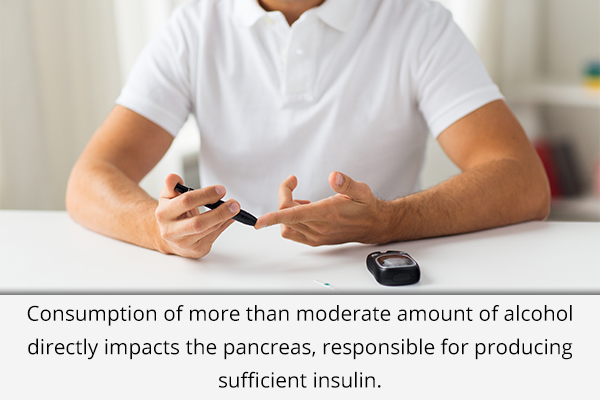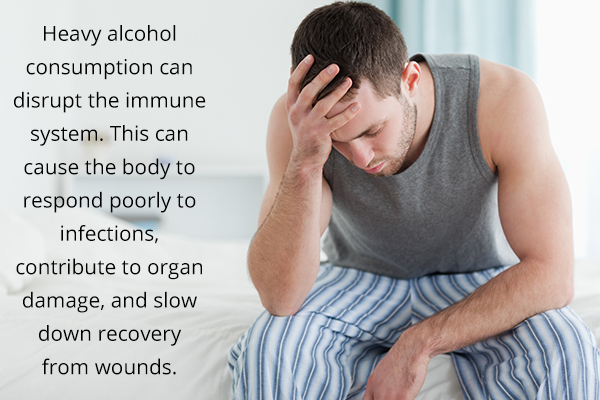In this article:
A lot of people all over the world drink alcohol when they are having meals with friends or to unwind at the end of a stressful day. From feeling slightly buzzed to experiencing a light headache, the effects of alcohol can be felt almost immediately.

According to the Centers for Disease Control and Prevention (CDC), moderate drinking is defined as 2 drinks or less a day for men and 1 drink or less a day for women. The CDC also advises individuals who do not normally consume alcohol not to start drinking for any reason and that drinking less is always better than drinking more. (1)
Alcohol consumption can induce many short-term and long-term effects. The short-term effects include: (1)
- Risk of injuries due to falls or accidents
- Incidents of violence
- Risky sexual activity with unknown partners, resulting in a risk of transmitting diseases
- Miscarriages, still-births, or birth defects in children
Long-Term Side Effects of Overdrinking
When alcohol is consumed more than the recommended amounts, it can lead to the following consequences in the body.
1. Damage to the endocrine glands
The endocrine system is responsible for maintaining healthy communication between the organs of the body and ensuring that body functions progress smoothly. The thyroid, pituitary, and hypothalamus form the endocrine system. (2)
Large amounts of alcohol consumption over a long period can cause disruptions in this communication and serious hormonal imbalances. (2)
2. Inflammation
Excessive consumption of alcohol causes inflammation in the gut that can lead to several diseases. Liver diseases, inflammatory bowel disease, and even cancers of the gut are all attributed to alcohol. (3)
The inflammation also causes a leaky gut, where bacteria leach out into the bloodstream, causing diseases. (3)
3. Imbalance of blood sugar levels

Consumption of more than the moderate amount of alcohol directly impacts the pancreas, where cells are responsible for producing sufficient insulin. Alcohol disrupts this production and causes insulin resistance, which then increases blood sugar levels. (4)
4. Damage to the central nervous system
The brain is protected by a blood-brain barrier that prevents molecules larger than glucose to cross over. This not only protects the brain but also ensures the brain receives glucose for its functioning. (5)
Alcohol is a smaller molecule and can easily enter the blood-brain barrier and affect the brain. It shrinks the tissues of the brain, destroys brain cells, and compromises the functioning of the central nervous system. (6)
Excessive drinking over a long period can cause issues with memory and cognition.
5. Digestive distress
One of the main changes alcohol brings about is inflammation of the intestines that can cause organ damage. (3) The inflammation can result in inflammatory bowel disease, which further causes nausea, constipation, or diarrhea. (3)
Alcohol also disrupts the microbiota of the intestines. It increases the permeability of the intestines, allowing bacteria to enter the bloodstream and cause alcoholic liver disease and a rise of free radicals in the body. (7)
6. Weight gain

Alcohol contains “empty calories,” as 1 g of alcohol provides 7 calories and no other nutrients.
Studies have shown that alcohol is more addictive than other dietary sources, and excessive consumption can cause an energy imbalance where more calories are consumed, ultimately causing weight gain. (8)
7. Risk of heart diseases
Excessive consumption of alcohol can bring about changes to the cardiovascular system and damage the heart. It can cause changes in blood pressure, increasing the chances of stroke and heart attack.
Because alcohol intake can induce inflammation, it can also lead to cholesterol accumulation in the muscles of the blood vessels, causing atherosclerosis. (9)
8. Compromised reproductive health
Human and animal studies have shown alcohol causes changes in ovulation and the regularity of the menstrual cycle. It may increase the levels of testosterone and other male hormones in women, exerting a negative impact on fertility.
Heavy drinking also reduces the total number of viable eggs in the ovaries. (10)
A study evaluating the use of alcohol in people undergoing in vitro fertilization showed that women consuming at least 4 drinks per week were 16% less likely to have live births. (11)
Moreover, heavy alcohol consumption in men causes a reduction in testosterone levels, sperm production, and testicular cells. It can also affect sexual activity by causing erectile and ejaculatory dysfunctions, leading to difficulty in conceiving. (10)
9. Weak immunity

Heavy alcohol consumption can disrupt the immune system. This can cause the body to respond poorly to infections, contribute to organ damage, and slow down recovery from wounds. (12)
In addition, alcohol has been linked to pulmonary infections including tuberculosis, pneumonia, and respiratory syncytial virus infection. (12)
10. Mood disorders
Psychiatric disorders such as depression and anxiety commonly occur with heavy alcohol use. (13) The mechanism by which alcohol use causes depressive disorders is unknown; however, several reviews have linked alcohol to depression-like symptoms. (13)
Seeking Help
If you recognize yourself or your loved one as suffering from one of the many consequences of overdrinking, it is important to seek the right kind of help, including the following:
- Finding alcohol support groups in your area. Alcoholics Anonymous is one of the most popular and widely used support groups.
- Seeking therapy to identify the trigger to drinking and finding ways to resolve or cope with it.
- Medical treatment to deal with the consequences of alcohol.
- Medication (as recommended by your doctor) to help with cravings.
Some Suggest Alcohol Is Good for Health. Is It True?

Some studies and reports suggest light to moderate alcohol consumption may have a positive impact on health by reducing the chances of heart disease. However, as alcohol is highly addictive, it is essential to limit its use and not rely on alcohol to seek good health.
Final Word
Alcohol use disorder is a condition where a person becomes addicted to alcohol and consumes large amounts of drinks. Heavy use of alcohol is linked to several detrimental health effects such as disruptions to the endocrine glands, weak immunity, digestive disorders, compromised reproductive and sexual health, and mood disorders.
Alcohol addiction can be difficult to get rid of, and any person needs a strong support system to move past their addiction.
- Was this article helpful?
- YES, THANKS!NOT REALLY


